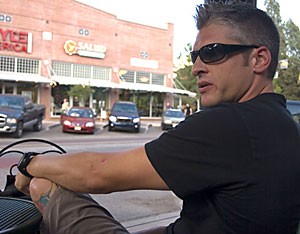In Kandahar, Afghanistan, Chris Piercecchi, a UA philosophy senior, was nursing a hurt knee and had gotten only a few hours of sleep within several days when he was alerted to the news that four Navy SEALS had been involved in a deadly firefight while on a Special Forces mission in the country’s rugged hills.
Of the four, only two had survived; of those two, rescue forces had immediate information that lead to only one. The other did not survive.
The scenario was dangerous, at best. It was June 2005 and U.S. forces has just suffered the greatest loss of Special Forces troops since Operation Enduring Freedom began when a helicopter carrying 16 men was shot down while responding to calls for help from the SEALS, under attack.
Once informed of the situation, Piercecchi felt a surge of adrenaline and urgency.
“”I wasn’t excited in a selfish sense, I was excited in like, let’s get up there now and get these guys, because we know full well what is going to happen to them every day they’re out there. Every minute that I was sitting here, was every minute that he was avoiding death.””
An Air Force pararescueman, Piercecchi knew the danger that he and his partner, Josh Appel, a UA College of Medicine grad for only seven days before his deployment, were going into. The area was known for the Taliban and Al-Queda insurgents who frequented it.
“”I was supposed to go home in three days,”” Appel said. “”(My) first thought was ‘I think I’m going to be late.'””
After creating a plan in which pararescue troops detailed the terrain and the known factors of the region, Pararescue Team 306 set out on their first search for Marcus Luttrell.
“”We waited all night until sunrise and were listening over the radio for any signal,”” said Jeff “”Spanky”” Peterson, the pilot of the rescue mission, who is now stationed at Davis-Montham Air Force Base. “”I kept saying, ‘show yourself.'””
But as the sun began to creep up from behind the mountains and the threat of being shot down increased, the group turned around and headed back to base, without sight of Luttrell.
The next day, the group got a bit of hope. A village elder had wandered about eight miles to the nearest Marine base with a note from Luttrell that clued U.S. forces into the fact that he was wounded, but alive, and was being housed and cared for by Afghani civilians.
“”At that point we knew where he was,”” Piercecchi said.
With an A-10 flying over their heads dropping bombs and bullets onto ground targets in order to clear a path, the helicopter, manned by Peterson, that was carrying Piercecchi and Appel entered into chaos the next night, with only 590 gallons of the 740-gallon fuel capacity to make the aircraft lighter and better able to handle altitude pressure in the region.
“”It was pitch-black and dirt was blowing up, and the helicopter began drifting left into the mountains,”” Peterson said. “”I started hearing ‘stop left, stop left’ and turned the aircraft hard right.””
Meanwhile, Appel and Piercecchi were lying on the floor of the aircraft, waiting for what they thought was inevitable impact.
“”I was convinced we were going to crash,”” Piercecchi said. “”It was orchestrated chaos, but low and behold, we ended up landing.””
Immediately, Piercecchi and Appel exited out of the right side of the helicopter, taking their positions on the ground.
The plan was simple: Meet up a few feet from the helicopter, assess the situation, make the rescue and get out.
However, once they exited the plane, the two saw a man dressed in Afghani robes walking toward the back of the aircraft, a no-no to trained forces. To protect the helicopter, Piercecchi sprung into action.
“”I immediately pulled out my weapon, an M4. I had a green laser on my gun and night vision goggles and I saw the dot coming from the ground, up to his chest,”” he said. “”I was perfectly prepared to shoot him, but as soon as I made that decision, I saw a second man coming up 15 feet behind him.””
“”Something went off in my head – there was some reason I shouldn’t shoot,”” he said.
Good thing.
The man Piercecchi almost shot turned out to be Luttrell, dressed in the robes of the village men who helped keep him alive.
“”We jumped in the aircraft and started yelling ‘go, go, go,’ because we could see enemy fire 100 meters away from us. I looked to Marcus, who had put his hand out, and said, ‘Welcome home, brother.'””
The story, which Luttrell has turned into a book called “”The Lone Survivor: The Eyewitness Account of Operation RedWing and the Lost Heroes of Seal Team 10,”” has become a best seller that could potentially be turned into a movie.
Peterson, Appel and Piercecchi have all receive the Air Force Air Medal, a prestigious medal awarded to individuals with outstanding meritorious achievement while in aerial flight.
With all of the excitement and terror, Appel said he had a difficult time adjusting to life back in Tucson, where he returned after the rescue mission to begin his internship at the UA College of Medicine.
“”It took a while,”” he said. “”I didn’t realize how tough it was until I looked back and realized what a mess I was.””
Appel is now an emergency medicine resident. Piercecchi hopes to be a physician and has recently applied to the UA College of Medicine, with interviews in a few weeks.
“”This is what drove me to medicine,”” Piercecchi said. “”I went to the pinnacle, I had the mission of a lifetime and now I feel that the time has come to take the next step and dedicate my life to medicine, to give in a capacity that I am able to.””









